DS Automobiles DS 7 vs Mercedes E Class – Which car suits you better?
Two cars, one duel: DS Automobiles DS 7 meets Mercedes E Class.
Which one wins in performance, efficiency and value for money? Find out now!
Costs and Efficiency:
Price and efficiency are key factors when choosing a car – and this is often where the real differences emerge.
DS Automobiles DS 7 has a noticeable advantage in terms of price – it starts at 41900 £, while the Mercedes E Class costs 50500 £. That’s a price difference of around 8610 £.
Fuel consumption also shows a difference: DS Automobiles DS 7 manages with 1.30 L and is therefore somewhat more efficient than the Mercedes E Class with 1.50 L. The difference is about 0.20 L per 100 km.
As for range, the Mercedes E Class performs clearly better – achieving up to 116 km, about 51 km more than the DS Automobiles DS 7.
Engine and Performance:
Power, torque and acceleration are the classic benchmarks for car enthusiasts – and here, some clear differences start to show.
When it comes to engine power, the Mercedes E Class has a evident edge – offering 585 HP compared to 360 HP. That’s roughly 225 HP more horsepower.
In acceleration from 0 to 100 km/h, the Mercedes E Class is clearly quicker – completing the sprint in 4 s, while the DS Automobiles DS 7 takes 5.70 s. That’s about 1.70 s faster.
In terms of top speed, the Mercedes E Class performs barely noticeable better – reaching 250 km/h, while the DS Automobiles DS 7 tops out at 235 km/h. The difference is around 15 km/h.
There’s also a difference in torque: Mercedes E Class pulls distinct stronger with 750 Nm compared to 520 Nm. That’s about 230 Nm difference.
Space and Everyday Use:
Whether family car or daily driver – which one offers more room, flexibility and comfort?
Both vehicles offer seating for 5 people.
In curb weight, DS Automobiles DS 7 is hardly perceptible lighter – 1651 kg compared to 1810 kg. The difference is around 159 kg.
In terms of boot space, the DS Automobiles DS 7 offers minimal more room – 555 L compared to 540 L. That’s a difference of about 15 L.
When it comes to payload, Mercedes E Class distinct takes the win – 640 kg compared to 424 kg. That’s a difference of about 216 kg.
Who comes out on top?
Overall, the Mercedes E Class shows itself to be wins the duel decisively and secures the title of DriveDuel Champion.
It convinces with the more balanced overall package and proves to be the more versatile choice for everyday use.
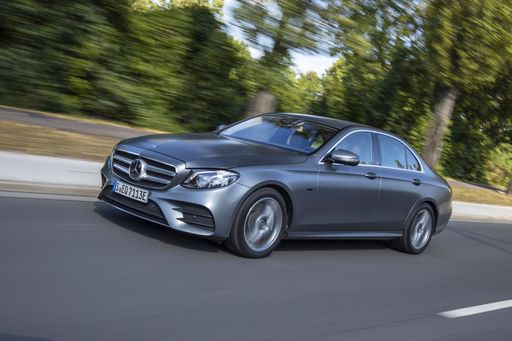
Mercedes E Class
DS Automobiles DS 7
The DS 7 stands out with its striking design and luxurious comfort, making it a true embodiment of French elegance in the SUV segment. Inside, the cabin showcases a blend of high-quality materials and innovative features that cater to both driver and passenger needs. With its impressive road presence and refined driving dynamics, the DS 7 promises a captivating driving experience that doesn't compromise on style.
details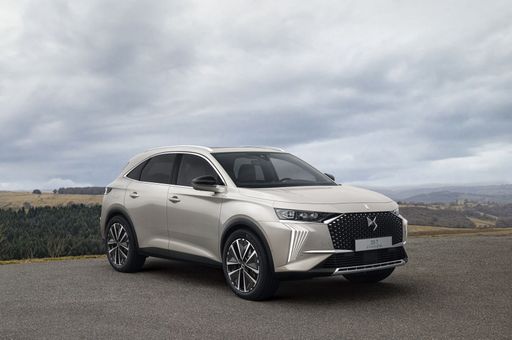 @ media.stellantis.com
@ media.stellantis.com
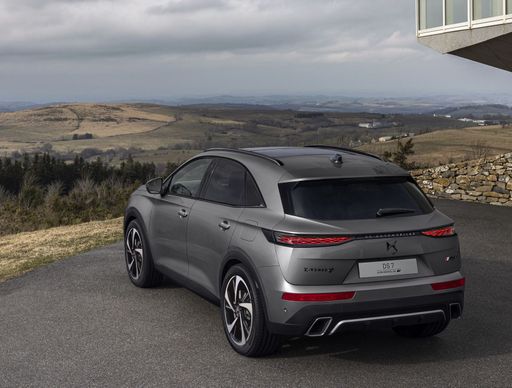 @ media.stellantis.com
@ media.stellantis.com
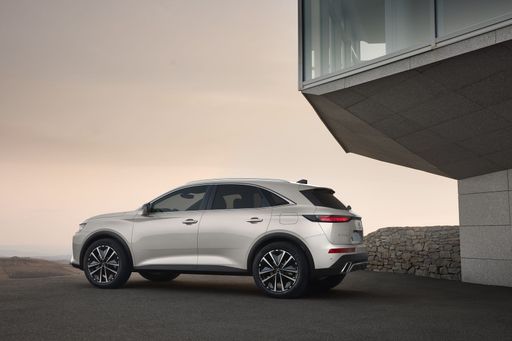 @ media.stellantis.com
@ media.stellantis.com
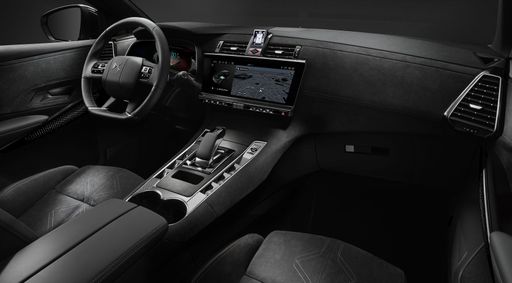 @ media.stellantis.com
@ media.stellantis.com
Mercedes E Class
The Mercedes-Benz E-Class Saloon epitomises sophistication and innovation, offering a seamless blend of elegant design and cutting-edge technology. Its refined interior ensures exceptional comfort, making every journey a luxurious experience. The driving dynamics are impressively balanced, providing both agility and smoothness, perfect for both city driving and long-distance cruising.
details @ group-media.mercedes-benz.com
@ group-media.mercedes-benz.com
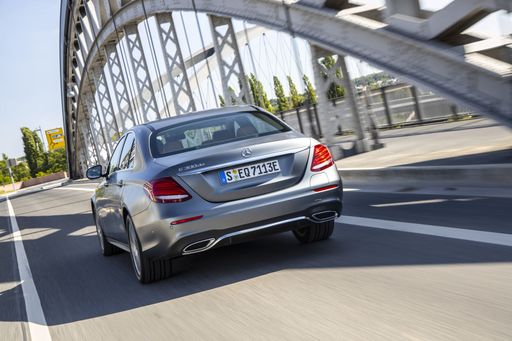 @ group-media.mercedes-benz.com
@ group-media.mercedes-benz.com
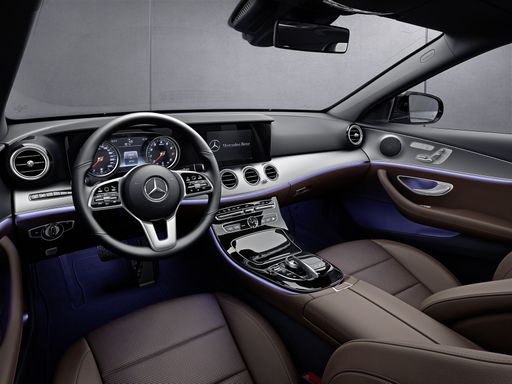 @ group-media.mercedes-benz.com
@ group-media.mercedes-benz.com

|

|
|
|
|
Costs and Consumption |
|
|---|---|
|
Price
41900 - 59300 £
|
Price
50500 - 119700 £
|
|
Consumption L/100km
1.3 - 5.5 L
|
Consumption L/100km
1.5 - 7.5 L
|
|
Consumption kWh/100km
-
|
Consumption kWh/100km
-
|
|
Electric Range
50 - 65 km
|
Electric Range
101 - 116 km
|
|
Battery Capacity
12.90 kWh
|
Battery Capacity
21.20 kWh
|
|
co2
30 - 145 g/km
|
co2
39 - 172 g/km
|
|
Fuel tank capacity
43 - 55 L
|
Fuel tank capacity
50 - 66 L
|
Dimensions and Body |
|
|---|---|
|
Body Type
SUV
|
Body Type
Sedan
|
|
Seats
5
|
Seats
5
|
|
Doors
5
|
Doors
4
|
|
Curb weight
1651 - 2002 kg
|
Curb weight
1810 - 2390 kg
|
|
Trunk capacity
555 L
|
Trunk capacity
370 - 540 L
|
|
Length
4593 mm
|
Length
4949 - 4959 mm
|
|
Width
1891 mm
|
Width
1880 mm
|
|
Height
1625 mm
|
Height
1468 - 1480 mm
|
|
Max trunk capacity
1750 L
|
Max trunk capacity
-
|
|
Payload
398 - 424 kg
|
Payload
530 - 640 kg
|
Engine and Performance |
|
|---|---|
|
Engine Type
Diesel, Plugin Hybrid
|
Engine Type
Petrol MHEV, Plugin Hybrid, Diesel MHEV
|
|
Transmission
Automatic
|
Transmission
Automatic
|
|
Transmission Detail
Automatic Gearbox
|
Transmission Detail
Automatic Gearbox
|
|
Drive Type
Front-Wheel Drive, All-Wheel Drive
|
Drive Type
Rear-Wheel Drive, All-Wheel Drive
|
|
Power HP
130 - 360 HP
|
Power HP
186 - 585 HP
|
|
Acceleration 0-100km/h
5.7 - 11.9 s
|
Acceleration 0-100km/h
4 - 8.5 s
|
|
Max Speed
195 - 235 km/h
|
Max Speed
222 - 250 km/h
|
|
Torque
300 - 520 Nm
|
Torque
320 - 750 Nm
|
|
Number of Cylinders
4
|
Number of Cylinders
4 - 6
|
|
Power kW
96 - 265 kW
|
Power kW
137 - 430 kW
|
|
Engine capacity
1499 - 1598 cm3
|
Engine capacity
1993 - 2999 cm3
|
General |
|
|---|---|
|
Model Year
2024 - 2025
|
Model Year
2024 - 2025
|
|
CO2 Efficiency Class
E, B
|
CO2 Efficiency Class
E, F, B, D
|
|
Brand
DS Automobiles
|
Brand
Mercedes-Benz
|
What drive types are available for the DS Automobiles DS 7?
The DS Automobiles DS 7 is available as Front-Wheel Drive or All-Wheel Drive.
The prices and data displayed are estimates based on German list prices and may vary by country. This information is not legally binding.
